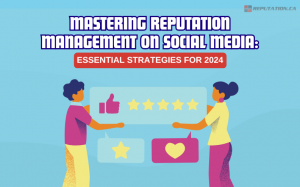Reputation management is essential for maintaining and improving your brand’s online image. It involves monitoring online mentions, responding to feedback, and using tools to manage your brand’s reputation effectively. In this article, we’ll cover these key strategies to help you protect and enhance your brand’s reputation.
Key Takeaways
- Online reputation management is essential for enhancing brand credibility, improving customer engagement, and mitigating the impact of negative customer interactions.
- Continuous monitoring of brand mentions and responding promptly to both positive and negative reviews are key strategies for maintaining a favorable online reputation.
- Utilizing reputation management tools and developing a crisis management plan are critical for proactively managing brand perception and addressing potential threats.
Understanding Reputation Management

Online reputation management involves monitoring and influencing how a brand is perceived by consumers. This focused approach can enhance brand credibility and awareness, making it a vital aspect of modern business strategy. A strong reputation not only attracts more talented employees but also reduces turnover, leading to a more stable and productive workforce.
Moreover, a solid reputation can improve overall marketing effectiveness and consumer engagement. Brands that actively manage their brand’s online reputation can mitigate the negative impact of mistakes made in customer interactions.
In essence, reputation management is about monitoring consumer perception and taking proactive steps to improve your brand’s image.
Key Elements of Online Reputation Management

Effective online reputation management hinges on several key elements. First and foremost is the continuous monitoring of brand mentions, which provides insights into customer sentiment and the overall health of your brand’s reputation. This involves keeping an eye on online reviews, social media accounts, and other online mentions to gauge public perception.
Responding to feedback, especially negative reviews, is equally crucial. It shows a commitment to customer service and addresses concerns effectively, thereby enhancing your brand’s online presence. Establishing a strong digital presence through various strategies, including consistent online content and active engagement on social media, can also positively influence customer perception and bolster your reputation.
Ultimately, online reputation management is an ongoing process that requires vigilance and dedication. Staying proactive and responsive helps businesses maintain a strong and favorable online reputation.
The Role of Online Reviews
Online reviews play a pivotal role in shaping how the average consumer perceives brands and influence their purchasing decisions. A staggering 77% of consumers read review sites when browsing local businesses, underscoring their importance. However, the impact of negative reviews cannot be ignored, as 94% of customers are deterred by them, highlighting the critical need for effective reputation management.
Positive reviews serve as powerful social proof, boosting consumer confidence and trust in your brand. Setting specific goals for the volume of reviews can enhance your business’s credibility and social proof, driving more potential customers to choose your brand. Moreover, using positive content can help improve your search rankings, countering the visibility of negative reviews.
Engaging with both positive and negative reviews fosters customer loyalty and demonstrates a commitment to service. The consistency of customer feedback and review management received also plays a significant role in shaping the overall image of your brand. Utilizing reputation management software can help businesses monitor online reviews and promote positive customer experiences.
Monitoring Your Brand’s Online Mentions
Monitoring your brand’s online mentions is crucial for shaping public perception and understanding your brand’s reputation. Continuously tracking these mentions helps prevent negativity from spreading and allows you to stay on top of what is being said about your brand. Using media monitoring tools enables brands to receive real-time notifications of mentions across all online sources, providing a comprehensive view of online conversations.
The Brand Monitoring app, for instance, automatically collects mentions from various platforms, offering an efficient way to stay informed. Setting up filters and keyword tracking allows you to monitor specific types of conversations related to your reputation, ensuring you catch any potential issues before they escalate.
Monitoring social media channels is equally important, as it provides insights into public perception and potential issues quickly. Engaging with brand mentions promptly can help mitigate negative feedback and leverage positive conversations to enhance your brand’s image.
Responding to Negative Comments
When it comes to negative reviews, the first step is to evaluate their intent. Some negative comments may be spam or unconstructive, and it’s crucial to identify these before deciding whether to respond. Aim to respond to legitimate negative reviews within 24-48 hours to show your commitment to customer feedback. Maintaining professionalism and avoiding defensiveness is key to handling negative reviews effectively.
Personalizing your responses by addressing reviewers by name can enhance the authenticity of your reply. Acknowledging the issue and apologizing is essential, as it shows that you take their concerns seriously. Offering a resolution, such as a refund or discount, can help address customer concerns effectively and turn a negative experience into a positive one.
Keeping responses brief and focused helps prevent lengthy disputes in the public space. Encouraging customers to discuss their issues privately can help resolve complications away from public scrutiny. Following up with customers after addressing their concerns reinforces your commitment to their satisfaction and helps protect your brand’s reputation.
Encouraging Positive Reviews

Encouraging positive reviews is crucial for enhancing your brand’s online reputation. Integrating review requests into the post-purchase process can streamline the customer journey and prompt feedback. Offering incentives like discounts or entries into contests can motivate customers to leave reviews, increasing the likelihood of receiving favorable feedback.
Requesting reviews right after a positive customer experience can significantly increase the chances of receiving positive feedback. Personalizing the request for reviews can also enhance customer engagement and response rates. Engaging with customers during positive interactions, such as in-store visits, can effectively prompt them to leave reviews and share their positive experiences.
Gathering customer feedback through various channels enhances transparency and boosts credibility. Positive reviews not only improve your brand’s online reputation but also attract more customers, thereby driving sales and business growth.

Leveraging social media for reputation management is essential in today’s digital age. A strong social media reputation fosters trust with customers, leading to improved sales and customer relations. Regular engagement with customers and prompt responses to reviews help maintain a positive online presence. Engaging proactively on social media helps to maintain a positive brand image by addressing negative comments before they escalate.
Being transparent and authentic in your responses helps establish trust with your audience. Regularly creating and sharing positive content is vital for building a favorable online presence. Utilizing AI tools can enhance social media reputation management by providing insights into customer sentiment and helping you respond promptly.
Companies should prioritize engaging with their audience on multiple social media platforms to maintain a cohesive brand experience. Employee advocacy can also enhance your brand’s reputation by empowering staff to positively engage with online audiences.
Competitive Benchmarking for Reputation Management
Competitive benchmarking provides brands with insights, benchmarks, and recommendations to inform their reputation management strategies. Tools like RepScore can be used to compare your brand’s reputation against competitors, allowing for effective strategic adjustments. Analyzing competitor performance in online reputation helps businesses identify strengths and weaknesses relative to rivals.
Tracking mentions of competitors can provide valuable insights into market trends and customer preferences for your target audience. By analyzing the types of sources for brand mentions, such as social media, blogs, and news articles, you can enhance your reputation management strategies.
Incorporating competitive benchmarking into your reputation management strategy allows you to stay aligned with industry standards and consumer expectations.
Creating Consistent Online Content
Creating consistent online content is vital for building and maintaining a strong brand online identity. A well-defined brand identity, including consistent voice and visual elements, fosters trust and recognition among customers. Aligning your content with brand values enhances authenticity and customer loyalty.
A strong content strategy that shares valuable insights positions your brand as an industry expert and improves visibility. Regularly updating content fosters audience trust and establishes authority in the industry. Utilizing a content calendar can help in maintaining a steady flow of relevant information, ensuring your audience remains engaged and informed.
Utilizing Reputation Management Tools

Utilizing reputation management tools can significantly enhance your brand’s online reputation. Many tools offer a single platform for managing reviews, social media interactions, and customer feedback, providing a comprehensive approach to reputation management. Effective reputation management tools provide real-time alerts about customer opinions, enabling timely responses.
The integration capabilities of these tools allow seamless connection with other business applications for enhanced functionality. For instance, Qualtrics offers tools that provide insights into competitors’ performance, aiding companies in developing data-driven strategies. Users can benefit from collaborative workspaces that allow teams to manage campaigns together using reputation management software.
Businesses can enhance their business online visibility by actively managing customer reviews, as search engines favor sites with high-quality user-generated content. Various online reputation management tools are available to support businesses in enhancing their public image.
Developing a Crisis Management Plan
Developing a crisis management plan is essential for preparing brands for potential reputation threats. A proactive reputation management plan is crucial during a crisis and can significantly impact your business’s reputation. A crisis management strategy should outline internal communication plans and team roles for handling public responses.
Including a tone guide in the crisis management plan ensures consistent brand messaging during a crisis. Responding to negative comments quickly helps prevent escalation of issues and protects your brand’s tone and reputation. Conducting sentiment analysis of brand mentions helps identify potential crises by categorizing mentions as positive, neutral, or negative.
Long-term Reputation Management Strategies
Long-term reputation management is a continuous process that requires ongoing attention. Brand reputation management is not a one-time effort; it demands consistent monitoring and proactive measures. The aim of online reputation management is to neutralize negative sentiments and promote positive ones.
A significant challenge of managing online reputation is that much of it is out of your control. After repairing a negative reputation, businesses should switch to less aggressive management or focus on monitoring and responding. Communication guidelines help prioritize daily reputation management tasks and urgent issues.
Frequently Asked Questions
Managing online reputation involves addressing negative content swiftly to prevent competitors from exploiting any information gaps. A strong employer reputation attracts top talent, making reputation management vital for businesses looking to hire. Removing negative reviews quickly can eliminate barriers to sales, improving overall business performance.
Responding to negative reviews requires careful assessment to avoid escalating the situation and damaging the brand further. The timeline for resolving reputation issues can vary significantly, often taking several months to see substantial changes in search results.
Google’s search algorithm displays a variety of results based on user queries, including negative content, which is not specifically targeted at a brand.
Summary
In conclusion, managing your brand’s online reputation is a multifaceted and ongoing process. From understanding the basics to leveraging advanced tools and strategies, every step is crucial in protecting and enhancing your brand’s image. By monitoring online mentions, responding to feedback, encouraging positive reviews, and preparing for crises, businesses can build a resilient and favorable online reputation.
Remember, reputation management is not a one-time effort but a continuous journey. Stay proactive, engage with your audience, and consistently strive to improve your brand’s online presence. Embrace these strategies, and you’ll be well-equipped to navigate the ever-evolving digital landscape.
Frequently Asked Questions
How quickly should I respond to negative reviews?
It is advisable to respond to negative reviews within 24-48 hours to demonstrate your commitment to customer feedback and engagement. Prompt responses can significantly improve customer perceptions and enhance your business reputation.
What tools can help with online reputation management?
Qualtrics is an effective tool for managing online reputation, as it consolidates reviews, social media interactions, and customer feedback into a single platform. Utilizing such tools can significantly enhance your online presence and stakeholder perception.
How can I encourage positive reviews from customers?
Encouraging positive reviews can be achieved by seamlessly integrating review requests into the post-purchase process and providing incentives such as discounts or contest entries. This strategy effectively motivates customers to share their experiences.
What should be included in a crisis management plan?
A crisis management plan must include internal communication protocols, clearly defined team roles, and a tone guide for consistent messaging. This will ensure effective management and response during a crisis.
Why is competitive benchmarking important in reputation management?
Competitive benchmarking is crucial in reputation management as it offers valuable insights and benchmarks that help align your strategies with industry standards, enhancing your competitive edge. By understanding where you stand relative to competitors, you can make informed decisions to improve your reputation effectively.







